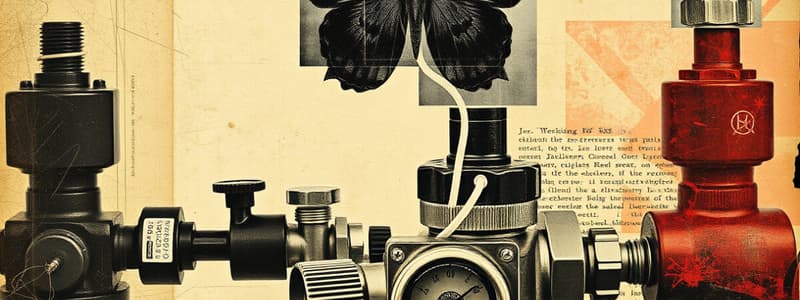Podcast
Questions and Answers
Which flame type is characterized by having a lower temperature than a neutral flame?
Which flame type is characterized by having a lower temperature than a neutral flame?
- Carbonizing flame (correct)
- Oxidizing flame
- Combustion flame
- Neutral flame
What is the flame temperature of a neutral flame?
What is the flame temperature of a neutral flame?
- 3470°C - 3500°C
- 3000°C - 3086°C
- 3090°C - 3100°C
- 3087°C - 3090°C (correct)
What indicates the amount of excess acetylene in a carbonizing flame?
What indicates the amount of excess acetylene in a carbonizing flame?
- The color of the flame
- The length of the flame
- The temperature of the flame
- The amount of feather on the cone (correct)
In which flame type is oxygen left over after combustion?
In which flame type is oxygen left over after combustion?
What occurs at the point where the feather just disappears in a flame?
What occurs at the point where the feather just disappears in a flame?
What is a primary disadvantage of single-stage regulators?
What is a primary disadvantage of single-stage regulators?
Which component is common to both single-stage and two-stage regulators?
Which component is common to both single-stage and two-stage regulators?
What pressure range does a two-stage regulator typically reduce cylinder pressure to in the first step?
What pressure range does a two-stage regulator typically reduce cylinder pressure to in the first step?
In what applications are two-stage regulators commonly used?
In what applications are two-stage regulators commonly used?
What is the function of the seat mechanism in a regulator?
What is the function of the seat mechanism in a regulator?
What is the appropriate action to take if a regulator malfunctions?
What is the appropriate action to take if a regulator malfunctions?
What does creep in a regulator indicate?
What does creep in a regulator indicate?
Which of the following is a symptom of creep?
Which of the following is a symptom of creep?
Which method should NOT be used for repairing a hose?
Which method should NOT be used for repairing a hose?
Why should copper tubing not be used to repair acetylene hoses?
Why should copper tubing not be used to repair acetylene hoses?
What should you do if a flashback burns a hose?
What should you do if a flashback burns a hose?
Which practice is important for handling industrial quality regulators?
Which practice is important for handling industrial quality regulators?
What is the recommended method for checking hoses for leaks?
What is the recommended method for checking hoses for leaks?
What is a potential consequence of attempting torch repairs without proper training?
What is a potential consequence of attempting torch repairs without proper training?
Which maintenance practice is NOT recommended for torch tips?
Which maintenance practice is NOT recommended for torch tips?
In the oxyacetylene outfit setup, what should be done after securing the cylinders?
In the oxyacetylene outfit setup, what should be done after securing the cylinders?
What condition should the surfaces of gloves and hands be in before setting up oxyfuel equipment?
What condition should the surfaces of gloves and hands be in before setting up oxyfuel equipment?
Which of the following is true regarding the inspection of mixer assemblies?
Which of the following is true regarding the inspection of mixer assemblies?
What is the purpose of reverse flow check valves in oxyfuel cutting and welding systems?
What is the purpose of reverse flow check valves in oxyfuel cutting and welding systems?
Which color is designated for oxygen hoses in oxyfuel cutting and welding?
Which color is designated for oxygen hoses in oxyfuel cutting and welding?
What is a characteristic feature of the fuel gas connector nut?
What is a characteristic feature of the fuel gas connector nut?
What is a common requirement for the positive pressure mixer in oxyfuel systems?
What is a common requirement for the positive pressure mixer in oxyfuel systems?
How do flashback arrestors work when flames travel back through the system?
How do flashback arrestors work when flames travel back through the system?
What type of thread is used for the oxygen hose connector to prevent incorrect connections?
What type of thread is used for the oxygen hose connector to prevent incorrect connections?
What are the two main purposes of mixers in oxyfuel systems?
What are the two main purposes of mixers in oxyfuel systems?
Which type of mixer is generally used with fuel gas pressures below 14 kPa?
Which type of mixer is generally used with fuel gas pressures below 14 kPa?
What is the function of steel ferrules in the fuel gas hose connection?
What is the function of steel ferrules in the fuel gas hose connection?
When a flashback arrestor is exposed to fire, what action does it take?
When a flashback arrestor is exposed to fire, what action does it take?
What is the purpose of purging the hoses in an oxyfuel outfit?
What is the purpose of purging the hoses in an oxyfuel outfit?
Which component does not require a sealing fibre washer for gas-tight connections?
Which component does not require a sealing fibre washer for gas-tight connections?
What should be used to check for leaks in an oxyfuel outfit?
What should be used to check for leaks in an oxyfuel outfit?
What hazard is associated with blowing out the acetylene hose?
What hazard is associated with blowing out the acetylene hose?
Why should ammonia not be used on oxyfuel equipment?
Why should ammonia not be used on oxyfuel equipment?
What type of threads do all oxygen connections have?
What type of threads do all oxygen connections have?
Which item is NOT part of the oxyfuel outfit's components?
Which item is NOT part of the oxyfuel outfit's components?
What is the first step in preparing the oxyfuel outfit?
What is the first step in preparing the oxyfuel outfit?
What is the first step in the procedure for shutting down oxyfuel equipment?
What is the first step in the procedure for shutting down oxyfuel equipment?
Which of the following must be done after closing the oxygen cylinder valve?
Which of the following must be done after closing the oxygen cylinder valve?
What should you do if heating or cutting is stopped for an extended period?
What should you do if heating or cutting is stopped for an extended period?
What is a backfire in oxyfuel equipment?
What is a backfire in oxyfuel equipment?
Which of the following is NOT a malfunction associated with oxyfuel equipment?
Which of the following is NOT a malfunction associated with oxyfuel equipment?
Which action helps prevent flashbacks in oxyfuel equipment?
Which action helps prevent flashbacks in oxyfuel equipment?
What must be done after the fuel gas cylinder valve is closed?
What must be done after the fuel gas cylinder valve is closed?
What should be done with the hoses after shutting down oxyfuel equipment?
What should be done with the hoses after shutting down oxyfuel equipment?
What does the Bourdon tube in a regulator primarily do?
What does the Bourdon tube in a regulator primarily do?
What is the minimum bursting pressure that oxyfuel hoses must be designed to withstand?
What is the minimum bursting pressure that oxyfuel hoses must be designed to withstand?
Which material is NOT mentioned as part of the construction of oxyfuel hoses?
Which material is NOT mentioned as part of the construction of oxyfuel hoses?
What is a common size of oxyfuel hoses used for most torches?
What is a common size of oxyfuel hoses used for most torches?
Why is it important to turn the adjusting screw of a regulator when it is out of service?
Why is it important to turn the adjusting screw of a regulator when it is out of service?
What do the gauge faces on oxyfuel gas regulators indicate?
What do the gauge faces on oxyfuel gas regulators indicate?
Which of the following is a requirement for oxyfuel hoses according to standards?
Which of the following is a requirement for oxyfuel hoses according to standards?
What is the primary function of oxyfuel hoses in welding and cutting?
What is the primary function of oxyfuel hoses in welding and cutting?
What is the recommended practice before lighting the torch?
What is the recommended practice before lighting the torch?
Why is it dangerous to light a torch using a mixture of oxygen and acetylene?
Why is it dangerous to light a torch using a mixture of oxygen and acetylene?
What happens if gas speed is set too low?
What happens if gas speed is set too low?
What is the speed of flame propagation for properly mixed oxygen and acetylene?
What is the speed of flame propagation for properly mixed oxygen and acetylene?
Which factor determines the size of the gas stream leaving the torch tip?
Which factor determines the size of the gas stream leaving the torch tip?
How should you balance the working pressures for regulators?
How should you balance the working pressures for regulators?
What should be avoided when lighting a torch?
What should be avoided when lighting a torch?
What could happen if the gas speed is set too high?
What could happen if the gas speed is set too high?
What is a critical part of checking regulators?
What is a critical part of checking regulators?
Which method is NOT advisable for igniting a torch?
Which method is NOT advisable for igniting a torch?
What condition can cause too little gas speed leading to backfires?
What condition can cause too little gas speed leading to backfires?
What happens during a burnback?
What happens during a burnback?
What is a potential cause of flashbacks?
What is a potential cause of flashbacks?
Which of the following is NOT a cause of backfires?
Which of the following is NOT a cause of backfires?
What should you do quickly if burnback occurs?
What should you do quickly if burnback occurs?
What differentiates burnbacks from flashbacks?
What differentiates burnbacks from flashbacks?
What immediate action should be taken to extinguish flames from a flashback?
What immediate action should be taken to extinguish flames from a flashback?
Which scenario can lead to an explosion causing a flashback?
Which scenario can lead to an explosion causing a flashback?
Which of the following is a characteristic of flashbacks?
Which of the following is a characteristic of flashbacks?
What aspect of hoses could lead to mixed gases and thus a flashback?
What aspect of hoses could lead to mixed gases and thus a flashback?
Flashcards are hidden until you start studying
Study Notes
Single-Stage Regulators
- Single-stage regulators convert cylinder pressure to working pressure in one step.
- Less precise control over delivery pressure is a disadvantage.
Two-Stage Regulators
- Two-stage regulators transition cylinder pressure to working pressure in two steps:
- First, reduce cylinder pressure to an intermediate pressure of 1241 kPa to 2758 kPa (180 psi to 400 psi).
- Then, adjust from intermediate to working pressure.
Applications for Two-Stage Regulators
- Commonly used in manifold systems, sensitive instrumentation, and experimental laboratory settings.
Regulator Malfunctions and Creep
- Creep occurs when high-pressure side valve fails, causing gas leaks, which can raise pressure above normal limits.
- Symptoms of creep include:
- Leaks from diaphragm failures at the first and second stage.
- Relief valve leaks due to first stage malfunctions.
- Remote repair solutions involve checking for ruptured diaphragms and cleaning valve components.
Hose Maintenance
- Test hoses for leaks using immersion in water under pressure.
- Avoid repairing hoses with tape; instead, cut and splice with approved fittings.
- Do not use copper tubing for acetylene hoses due to explosive reactions.
Flame Types in Oxyacetylene
- Carbonizing Flame: Rich in acetylene, lower temperature, produces excess carbon.
- Neutral Flame: Balanced oxygen and acetylene; temperature reaches 3090°C (5600°F).
- Oxidizing Flame: Rich in oxygen, can reach 3470°C (6300°F).
Oxyfuel Outfit Setup
- Purge hoses to remove contaminants; perform with caution using acetylene.
- Ensure secure cylinder connections and check for leaks using approved leak detection solutions.
Types of Fittings
- Flat-faced fittings require a fibre washer; bull-nosed fittings do not.
- Oxygen fittings have right-hand threads, while most fuel gases use left-hand threads.
Leak Detection Fluids
- Avoid petroleum-based detergents for detecting leaks on oxygen equipment.
- Use non-toxic leak detection fluids specifically designed for oxyfuel applications.
Torch and Mixer Maintenance
- Regular inspection and replacement of O-rings, seals, and gaskets are crucial for safety.
- Tips should be cleaned, stored properly, and not misused to maintain functionality.
Emergency Shutdown Procedures
- If a flashback occurs, initiate emergency shutdown by closing both cylinder valves and extinguishing flames.
Backfire, Burnback, and Flashback Causes
- Backfires are due to low gas speeds, dirty tips, or obstruction.
- Burnbacks involve combustion in the tip and mixer, often caused by hot tips.
- Flashbacks are the result of gas mixing in hoses due to unequal pressures or improper valve manipulation.
Oxyfuel Hoses
- Fuel gas hoses are red; oxygen hoses are green.
- Construction involves materials that are resistant to heat, wear, and various liquids.
- Standard sizes vary from 5mm to 10mm, with 6.4mm being the most common for general use.
- Hoses must meet CSA specifications and withstand a minimum bursting pressure of 2800 kPa (400 psi).### Regulator Gauge Faces
- Oxyfuel gas regulator gauges display pressure in metric (kPa) and imperial (psi) units.
- Oxygen cylinder pressure gauges may indicate remaining gas volume.
Storing Out-of-Service Regulators
- For regulators inactive for weeks, adjust the screw to apply spring pressure on the diaphragm; this keeps the valve stem off the seat and prevents corrosion.
- Before reusing, back off the adjusting screw before opening the source pressure.
Lighting the Torch
- Purge hoses by sequentially opening and closing torch valves to remove air or explosive mixtures, especially when multiple users are present.
- Use a proper spark igniter to light the torch; avoid matches or cigarette lighters due to burn risks.
- Do not ignite torches with a mix of oxygen and acetylene, as this can cause dangerous, explosive ignitions.
- A noisy, smoky flame often indicates improper acetylene flow; open the acetylene valve more fully to improve combustion and air quality.
Gas Speed and Speed of Flame Propagation
- Understanding gas speed and flame propagation is crucial to prevent backfires and ensure proper torch function.
Gas Speed
- Refers to the rate at which mixed gases exit the torch tip, measured in linear feet per second.
- Determined by tip orifice size; visually analogous to a stream of raw gasoline from an unlit torch.
Speed of Flame Propagation
- Describes how fast a flame moves in a stream of premixed gases.
- Properly mixed oxygen and acetylene has a flame propagation speed of 5 m/s to 7.5 m/s (17 ft/s to 25 ft/s).
- Lower gas speeds (below 5 m/s) can cause flames to burn inside the torch, leading to backfires.
- Excessive gas speeds (above 7.5 m/s) risk the flame leaving the tip, especially when heating edges and corners due to low resistance.
Checking and Balancing Pressures for Heating Tips
- Regulators may show a variance of up to 30 kPa (5 psi) in working pressure accuracy; regular checks and balances are necessary.
- Industrial regulators provide a rough pressure estimate suitable for cutting but require maximum control for heating operations.
Studying That Suits You
Use AI to generate personalized quizzes and flashcards to suit your learning preferences.




